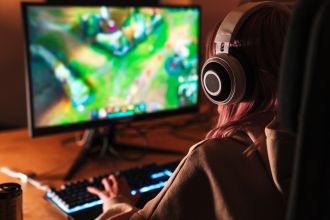-
How do we better talk about sex and gender in science?
Cell
Clearer language and more thought on whether categorising people by sex in science is needed to improve research related to sex and gender, according to a focus issue in Cell. The issue contains a series of opinion pieces and Q&As on sex and gender Read more about How do we better talk about sex and gender in science?
International -
Could the classic 'drinking bird' toy be our next electricity generator?
Device
Inspired by Dippy Bird, the classic drinking bird toy, international researchers have developed an engine that efficiently converts energy from water evaporation into electricity to power small electronics. The device produces energy outputs Read more about Could the classic 'drinking bird' toy be our next electricity generator?
InternationalSouth China University of Technology, China -
Common viruses trigger most cases of intussusception in children
Clinical Infectious Diseases
Viral infections trigger more cases ofintussusception, the common cause of bowel blockages in young children, than previously thought, according to a new study. Research at a Glance: A study led by Murdoch Children’s Research Institute has found Read more about Common viruses trigger most cases of intussusception in children
Australia; VICMurdoch Children's Research Institute (MCRI)|The University of Melbourne -
First gene therapy test in whole human liver
Nature Communication
Scientists from Children's Medical Research Institute in Sydney have, for the first time, tested novel gene therapies in a whole human liver - aiming to develop more effective treatments for inherited diseases. In a worldwide first-of-its-kind study Read more about First gene therapy test in whole human liver
Australia; NSWChildren's Medical Research Institute (CMRI) -
New ‘microcombs’ dreamt up under lockdown
Nature Photonics
While you were making lockdown sourdough, a NZ physicist was dreaming up a new way to transform laser beams. "Microcombs" are an emerging technology in which a miniscule ring made on a microchip (like the one inside your phone) can transform a Read more about New ‘microcombs’ dreamt up under lockdown
New Zealand; InternationalDodd-Walls Centre|University of Auckland -
Revealing the genetic code behind non-identical twins
Human Reproduction
A QIMR Berghofer-led international team of scientists has unlocked the genetic secrets behind why some mothers are more likely than others to conceive twins. The study, published in Human Reproduction, has identified seven genes that regulate the Read more about Revealing the genetic code behind non-identical twins
Australia; QLDQIMR Berghofer Medical Research Institute -
Patient-paramedic trust can help free up emergency departments
The professionalism and compassion of paramedics attending emergency calls can reduce unnecessary presentations at hospital emergency departments, according to University of the Sunshine Coast research by a veteran ambulance officer. The Read more about Patient-paramedic trust can help free up emergency departments
Australia; NSW; QLDUniversity of the Sunshine Coast -
For 3 days, the quantum world centred on Australia
Quantum Australia 2024
Business is ignoring the hype and preparing for moon-shot applications. THERE WAS A REAL buzz at Quantum Australia 2024 conference: the panels had diverse representatives from four corners of the globe, international heavy hitters appeared in Read more about For 3 days, the quantum world centred on Australia
Australia; International; NSWThe University of Sydney -
Biodiversity Council slams environmental law carve out for offshore oil and gas industry
Proposed amendments, hidden within the government’s Offshore Petroleum and Greenhouse Gas Storage Legislation Amendment (Safety and Other Measures) Bill 2024, would carve out the offshore oil and gas industry from needing to comply with national Read more about Biodiversity Council slams environmental law carve out for offshore oil and gas industry
Australia; VIC; ACTBiodiversity Council|The University of Melbourne|The Australian National University -
Excessive gaming causing health issues
Computers in Human Behaviour
University of Queensland research has found gaming for more than three hours a day can lead to health problems. University of Queensland research has found gaming for more than three hours a day can lead to health problems. Dr Daniel Read more about Excessive gaming causing health issues
Australia; NSW; QLDThe University of Queensland|The University of New South Wales...










































